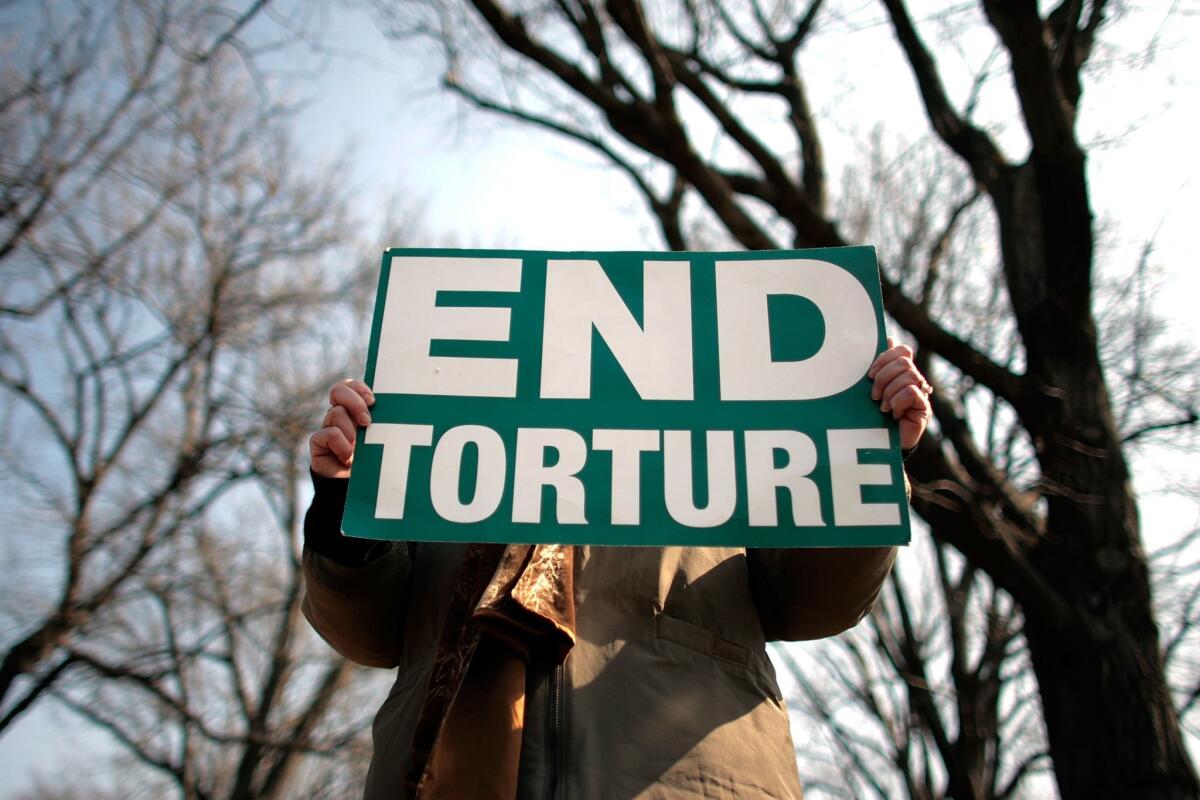Op-Ed: Prosecute the torturers: Itâs the law

Torture is a federal crime, and those who authorized it and engaged in it must be criminally prosecuted. On Tuesday, the Senate Intelligence Committee released a 499-page summary of a report that describes the brutal torture carried out by the U.S. government and its employees and agents. Such conduct is reprehensible, but it also is criminal. The only way to ensure that it does not happen again is to criminally prosecute those involved.
The Federal Torture Act states that whoever âoutside the United Statesâ commits or attempts to commit torture shall be imprisoned for not more than 20 years âand if death results to any person from conduct prohibited by this subsection, shall be punished by death or imprisoned for any term of years or for life.â The act broadly defines torture as an âact intended to inflict severe physical or mental pain or suffering upon another person within his custody or physical control.â This includes inflicting âsevere mental pain or suffering,â âthe intentional infliction or threatened infliction of severe physical pain or sufferingâ or âthe threat of imminent death.â
Additionally, the United States is one 156 nations that have ratified the Convention against Torture and Other Cruel, Inhuman or Degrading Treatment or Punishment. This is an international human-rights treaty that prohibits torture and defines torture in language almost identical to the federal criminal statute.
The report leaves no doubt that the law and treaty were violated. It describes gruesome and horrific torture. It tells of a man who was made to stand chained to a wall for 17 days and of detainees kept awake for nearly 180 hours while standing or in positions of stress. It tells of ice baths and of the killing of an Afghan, Gul Rahman, who died of suspected hypothermia in 2002 after he was beaten, stripped naked from the waist down and left chained to a concrete floor in near-freezing temperatures. The report documents repeated waterboarding, which international law has long defined as torture. The report details forced rectal feeding, which is described as intensely painful and is obviously enormously degrading.
This, of course, is not the first account of torture by the United States in the aftermath of 9/11. Jane Mayer, for example, published a stunning 2008 book, âThe Dark Side,â which described how the United States designed and implemented a systematic program of torture. Mayer described the death of torture victims and wrote about people being detained and tortured by mistake. Amnesty International also released a report documenting the torture by the CIA and its agents.
But this official report -- and it is just a summary of a much longer document that will not be released -- reveals illegal and abusive behavior in unprecedented detail. It also leaves no question that federal crimes were committed.
After taking office, President Obama decided against prosecuting those who had allegedly engaged in torture. He obviously felt that investigations and criminal proceedings would be divisive and wanted the nation to move forward. He felt that his repudiation of torture would be enough. That was a questionable choice at the time, but now it is clearly unacceptable.
The criminal law serves many functions: to express moral condemnation, to punish wrongdoers, to deter future wrongful conduct. Criminal prosecution of those who authorized and engaged in torture is essential to serve all of these functions. The U.S. government now must communicate to the world that we recognize that what was done was unacceptable and a violation of domestic and international law. Criminal prosecution is necessary to convey this message.
Those who authorized and engaged in torture should not be able to escape punishment because they thought that they were acting to protect national security. The Senate report expresses grave doubt as to whether the torture led to useful information. But that is beside the point. The ends came to justify the means, and the means were inhumane and abhorrent. The debate should not be about whether the torture worked. The federal criminal law and the treaty have no exception for effective torture.
Perhaps most of all, criminal prosecutions are needed to make sure that this does not happen again. That would send a message to all government officials: Those who plan, authorize and engage in torture will be criminally punished.
Reading the descriptions of torture is sickening and saddening. It should make us all ashamed of our government and outraged. But that is not enough. Those responsible should be held accountable, and President Obama should announce that criminal investigations and prosecutions are beginning immediately.
Erwin Chemerinsky is a law professor and dean of the UC Irvine School of Law.
Follow the Opinion section on Twitter @latimesopinion
More to Read
A cure for the common opinion
Get thought-provoking perspectives with our weekly newsletter.
You may occasionally receive promotional content from the Los Angeles Times.









